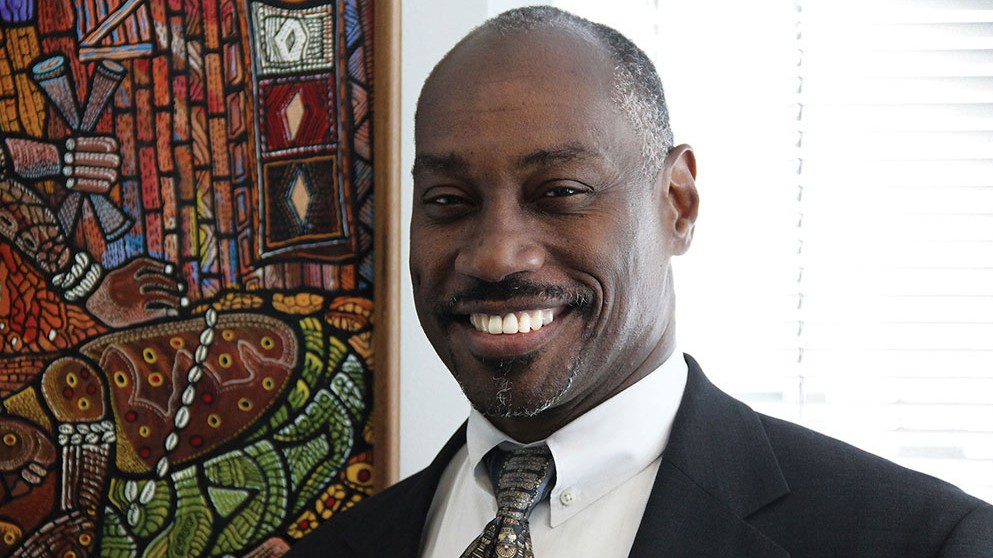Where Diplomats Are Concerned

Gentry Smith’s exemplary Foreign Service career recently earned him a presidential nomination — not to mention a great view of the world’s stage.
Gentry Smith (Political Science ’83) speaks Arabic and has lived in Japan, Egypt and Burma — a long way from his hometown in Halifax County in eastern North Carolina, where both his parents were schoolteachers. As a child, Smith often tagged along when his dad took students on field trips to NC State. “I loved touring around the campus,” he recalls. “I decided early on that NC State was the place for me.”
He began his college career in engineering, but he changed his major to political science after taking classes in the College of Humanities and Social Sciences. He also participated in the Air Force ROTC program. That experience — along with conversations about political theory and foreign policy with professors such as Abe Holtzman, Eva Rubin and Robin Dorff — sparked Smith’s interest in national security.
That interest in foreign policy and national security eventually led Smith to a 27-year career in the U.S. Department of State’s Foreign Service, culminating most recently in a position as deputy assistant secretary of state for countermeasures for the State Department’s Bureau of Diplomatic Security. In September 2014 President Obama nominated him to be director of the Office of Foreign Missions at the State Department, a position carrying ambassadorial rank and requiring U.S. Senate approval. [NOTE: Smith was confirmed by the Senate on June 15, 2015, as director of the Office of Foreign Missions.]
In his countermeasures role Smith facilitated the process of diplomacy abroad and at home, helping to ensure that American diplomats working overseas were protected and their needs were met. His office also worked to guarantee that State Department facilities and personnel in the United States were secure.
“Our strong focus is on protecting our personnel and also protecting our national security information,” says Smith. “We want to ensure that all our embassies meet our security standards.” In addition to protecting Americans against terrorism and weapons of mass destruction, Smith protected U.S. embassies and consulates overseas against the implantation of devices that could compromise intelligence.
Smith’s Foreign Service career began with a chance encounter at Crabtree Valley Mall. He had been an officer with the Raleigh Police Department for four years after graduating from NC State, and he was doing some off-duty work at the mall when he ran into a former police colleague who was home visiting while training to work in diplomatic security.
“We chatted and realized we had a mutual friend who was working in the Foreign Service,” Smith says. “I had toyed with the idea of entering the Foreign Service during senior year, and I thought if the opportunity ever presented itself, I would definitely want to pursue it.”
Smith reconnected with his old classmate. “He described the job, and it was the perfect blend of law enforcement and serving in the Foreign Service,” he recalls. “It sounded like it was created just for me.”
Soon Smith was forging a new career. He and his wife, NC State alumna Georgette Jackson Smith (BA ’80 Political Science; BA ’83 Business Management), raised three of their children in a variety of places all over the world.
“My kids grew up overseas. They have fond memories of their international experiences,” he says. “It’s an opportunity to experience other cultures and to share U.S. culture with other people.”
He’s witnessed events most of us only read about. “I’ve been exposed to certain things I never could have dreamed,” he says. “When the Soviet Union became the Russian Federation, I had a front-row seat. When Boris Yeltsin came to power, we were there within days. During the Middle East peace process, I was there when the agreement was signed between Jordan and Israel.”
Smith also remembers his first visit to KGB headquarters in Russia. “It was days after the failed Gorbachev coup. I was there with a colleague from the embassy, and we looked at each other and wondered if there had ever been any Americans in the facility before. We chuckled and thought, ‘Maybe we’re the first.’”
Gentry and Georgette Smith remain strong Wolfpack fans. He says he’s particularly pleased by the ways in which NC State has embraced global learning, both through its International Studies Program major and through its World Language Course Exchange, which allows students to take foreign languages offered by other universities in the UNC system.
“Americans have always had that pioneer spirit; we’ve always looked beyond our borders. We should never lose that,” says Smith. “I think the more we engage with the rest of the world, the better off we’ll be because we’ll understand each other better. That’s what it’s going to take.”
— Christa Gala
This article first appeared in the college’s Accolades 2015 magazine.


